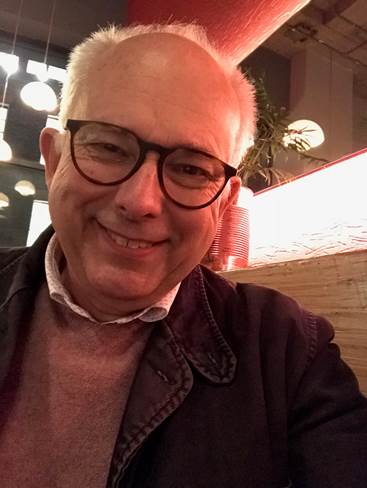Glynn Skerratt
ECG Bulletin July 2018
Dr Glynn Skerratt is the Secretary of the Environmental Chemistry Group. He has worked in the UK water industry and in higher education over the years and is now a freelance environmental consultant.
|
What inspired you to become a scientist?
Fascination and curiosity were all part of it. I always enjoyed chemistry at school — the colours, the shapes of the crystals and, of course, the smells. Graduating from the then Royal Institute of Chemistry trained me to think like a scientist, a skill that has been invaluable throughout the rest of my life. The simple beauty of 'the scientific method' is such an elegant, common-sensed and reasoned way of approaching things. How did you come to specialise in water? I wish I could say that it was because I was driven to improve our environment from childhood but, in truth, it all began with a job for the local water authority. My immersion in the water and sewage industry lasted almost 15 years, and I did my PhD part-time during that period. It focused on the hydrolysis kinetics of a class of organophosphorus compounds called ylids, and it taught me a lot about how to carry out research and the need for effective time management. I then spent 23 fulfilling years as a university lecturer teaching all kinds of analytical and environmental chemistry courses. Over the years, my teaching covered water and wastewater treatment technologies so my links with the water sector stayed strong. |
What advice would you give to anyone considering a career in environmental chemistry?
Society has a nasty habit of leaving things until the last minute before dealing with them. We will rely on our educators and technologists to face the unprecedented environmental challenges ahead. If you care about our future and environment, enjoy chemistry and want us to live our best lives in the best circumstances, then become an environmental chemist. It’ll put you in a great place to help mankind prosper in a responsible and sustainable way.
Could you describe your current job?
Since leaving academia I have been working as a freelance consultant, developing and delivering online training courses, writing expert witness reports and reviewing and assessing funding proposals for the European Commission. I also sit on some committees at the Royal Society of Chemistry and occasionally chair licence reviews for The Science Council. It’s nice to be able to put something back into the profession that has served me so well.
What are some of the challenges facing the environmental chemistry community?
Now, more than ever, environmental chemists can help counter the trivial way in which science is often presented in the mainstream media and to challenge any journalistic attempt to strive for balance when objectivity should be the target, given an overwhelming weight of current scientific evidence favouring one side of an argument. Helping to explain the concepts of risk and the balance of probability, and counter-balancing society’s morbid fascination with pseudoscience are also high on the agenda.
What is the most rewarding aspect of your career so far?
When a student thanks me for helping them achieve something they didn’t think or believe they were capable of, well, that’s just the best feeling ever. Almost as good as watching a beaming PhD student I’ve been supervising walk proudly across the stage to collect their doctorate.
If you weren’t a scientist what would you do?
If I weren’t a scientist, I’d be struggling hard to make any sense of the natural world in which we live… so I guess that’s the answer: I’d struggle. As for paying the rent, maybe I’d be trying to take half-decent photographs for a living.
And what do you do when you are not working?
I enjoy filling my days by taking quite poor photographs (see above), reading anything I can lay my hands on, walking slowly around the Lake District or the South Tyrol, and vaguely following recipes to see what turns out.
The ECG Interview: Glynn Skerratt
Society has a nasty habit of leaving things until the last minute before dealing with them. We will rely on our educators and technologists to face the unprecedented environmental challenges ahead. If you care about our future and environment, enjoy chemistry and want us to live our best lives in the best circumstances, then become an environmental chemist. It’ll put you in a great place to help mankind prosper in a responsible and sustainable way.
Could you describe your current job?
Since leaving academia I have been working as a freelance consultant, developing and delivering online training courses, writing expert witness reports and reviewing and assessing funding proposals for the European Commission. I also sit on some committees at the Royal Society of Chemistry and occasionally chair licence reviews for The Science Council. It’s nice to be able to put something back into the profession that has served me so well.
What are some of the challenges facing the environmental chemistry community?
Now, more than ever, environmental chemists can help counter the trivial way in which science is often presented in the mainstream media and to challenge any journalistic attempt to strive for balance when objectivity should be the target, given an overwhelming weight of current scientific evidence favouring one side of an argument. Helping to explain the concepts of risk and the balance of probability, and counter-balancing society’s morbid fascination with pseudoscience are also high on the agenda.
What is the most rewarding aspect of your career so far?
When a student thanks me for helping them achieve something they didn’t think or believe they were capable of, well, that’s just the best feeling ever. Almost as good as watching a beaming PhD student I’ve been supervising walk proudly across the stage to collect their doctorate.
If you weren’t a scientist what would you do?
If I weren’t a scientist, I’d be struggling hard to make any sense of the natural world in which we live… so I guess that’s the answer: I’d struggle. As for paying the rent, maybe I’d be trying to take half-decent photographs for a living.
And what do you do when you are not working?
I enjoy filling my days by taking quite poor photographs (see above), reading anything I can lay my hands on, walking slowly around the Lake District or the South Tyrol, and vaguely following recipes to see what turns out.
The ECG Interview: Glynn Skerratt


